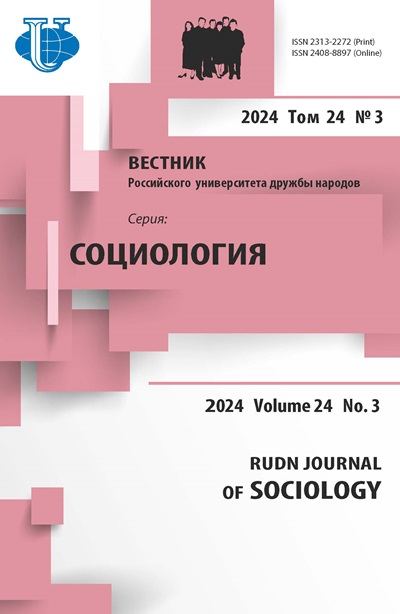Marcel Mauss: The practical idea of magic in “pantheism of mana”
- Authors: Yatsutsenko Y.V1
-
Affiliations:
- Peoples’ Friendship University of Russia
- Issue: No 2 (2015)
- Pages: 36-48
- Section: Articles
- URL: https://journals.rudn.ru/sociology/article/view/6454
Cite item
Full Text
Abstract
The article assembles theoretic models that define magic as an original social phenomenon fundamentally different from religion. Referring to the definitions of C. Lévi-Strauss, G. Gurvitch and V.I. Garadga the author focuses on the conception of magic proposed by Marcel Mauss. He defined magic as a practical idea in which knowledge and experience coincide, therefore, magic cannot exist as something abstract or theoretical, as an ordinary turnover of representations and experience but rather as their alloy. A representation becomes magical only at the rite, which in its turn can be considered magical only if the principle of mana was intended. According to Mauss, mana is a nominal universal measure of the intensity of connections between natural elements including people. For an adept of magic, the magic reasoning does not suppose discovering some meanings - rather an active interpretation of the idea of potential contact or contrast between all elements. In other words, mana does not possess any real content; this magic institution does not impose meanings, but allows to express and support them in the mutually conditioned oppositions in a differentiation system. Thus, we can identify a magical worldview based on mana as a plastic cognitive formation, in which we can trace a special interlacing of ‘cosmic freedom’ and ‘traditional unfreedom’ for a magician. Magic as knowledge does not substantialize in either society nor nature despite its direct appeal to the physical characteristics of objects and playing up the role orders. Magic is a fine example of a purely social formation for nothing else but inner social machinery explains it; the casuistry of magic cannot be objectified without special collective representations.
About the authors
Yu V Yatsutsenko
Peoples’ Friendship University of Russia
Author for correspondence.
Email: yulia.yatsutsenko@gmail.com
Sociology Chair
References
- Garadzha V.I. Sociologija religii. M.: Nauka, 1995.
- Gurvich G.D. Magija i pravo // Filosofija i sociologija prava: Izbrannye sochinenija. SPb.: Izdatel'skij Dom S.-Peterb. gos. un-ta, 2004.
- Levi-Stross K. Nepriruchennaja mysl' // Pervobytnoe myshlenie. M.: Respublika, 1994.
- Levi-Stross K. Predislovie k trudam Marselja Mossa // Social'nye funkcii svjashhennogo. SPb.: Evrazija, 2000.
- Moss M., Juber A. Nabrosok obshhej teorii magii // Social'nye funkcii svjashhennogo. SPb.: Evrazija, 2000.
- Keck F. Les théories de la magie dans les traditions anthropologiques anglaise et française // Methodos. URL: http://methodos.revues.org/90.
- Lévi-Srauss C. L'Eficacité Symbolique // Revue de l'histoire des religions. 1949. Vol. 135.
- Scubla L. Le symboloque chez Lévi-Strauss et chez Lacan // Journal du MAUSS. URL: http://www.journaldumauss.net/?Le-symbolique-chez-Levi-Strauss-et.














